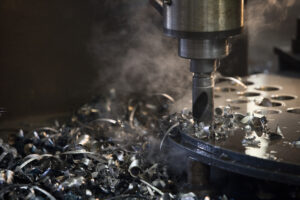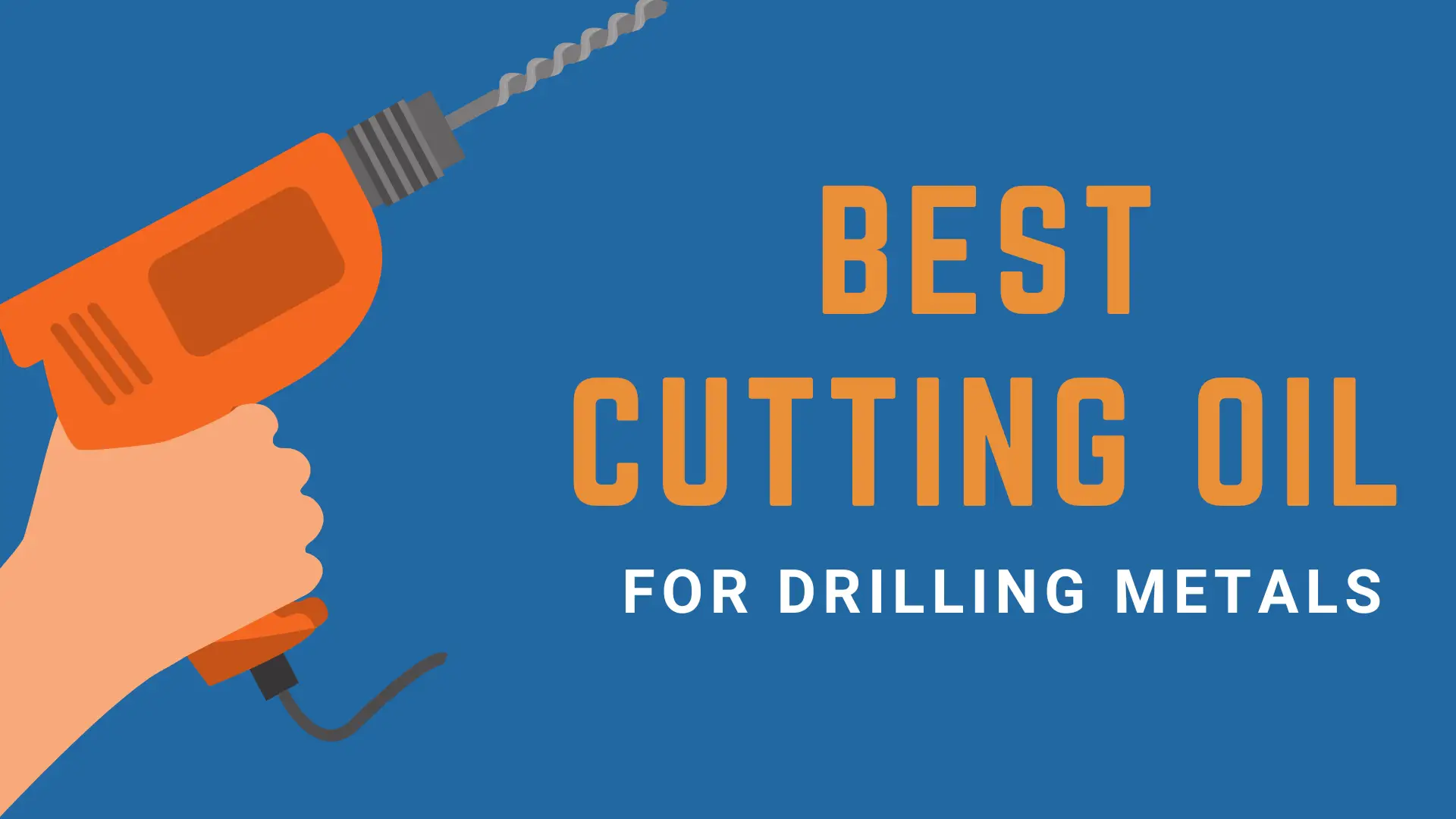As lubricants and cooling agents, cutting oils play a crucial role in metal drilling.
When you lubricate the drill or metal during drilling, it helps greatly to extend the life span of your drill bit by protecting it from being rusty due to excessive fractions. Aside from that, it also improves the quality of the boring hole and cools down the heated metal as it drills.
In this post, we will discuss cutting oil for drilling metal ( stainless steel and CI). We have discussed valuable information about the different cutting oil types suitable for different metals, their merits and demerits, and their appropriate usage. There is something valuable for everyone, regardless of whether you are a professional machinist or a DIY enthusiast.
Let’s get started!
Advantages of Cutting Oil for Drilling Metal
1. Cooling
The drilling tool and workpiece get heated up during the drilling process due to the high working speed. So, the cutting oils and fluids are primarily used to keep the metal cool down and reduce the excessive heat.
2. Friction Reduction
It is necessary to use lubrication when drilling, cutting, milling, and molding certain metals. The dry form is not suitable for working with them. Direct contact between the tool and workpiece leads to high friction. Once the cutting oil has been applied. Because there is an oil layer between both metals, the metal-to-metal contact is eliminated, reducing friction.
3. Prevents corrosion.
It is common for metal tools and workpieces to become rustic and corroded during the process of drilling metals due to the combination of high temperatures and moisture, and oxygen. Therefore, preventing your expensive drill bits and metal workpieces from cutting oil plays a crucial role.
Take good care while drilling with ferrous metals such as stainless steel, cast iron (CI), wrought iron, iron alloy, steel alloy, and carbon steel.
4. Remove Metal Particles
The metal parts that accumulate during drilling and machining can also be removed with cutting oil. It is essential to remove the remaining parts of your drill bit in order to protect it from wear and tear. Ensure these remaining parts don’t touch the drill bit tip to prevent potential damage to the drill bit.
5. Accuracy of Tool
Using the cutting oil is essential to protect your tool, boost its accuracy, and also prolong its life and increase its durability. All you have to do is choose the best cutting oil to lubricate your tools.
Disadvantages of Cutting Oil for Drilling Metal
1. Health and Environmental Hazards
Some cutting oils may have toxic effects that can be harmful to workers. These cutting oils need to be handled and disposed of very carefully so that you can save yourself as well as your environment properly.
2. Fire Hazard
When cutting oils come in contact with hot surfaces or sparks, they can ignite, posing a fire hazard. Therefore, before buying or using any cutting oil, ensure you know its properties and chemical composition, including its flammability.
3. Equipment Corrosion
Some cutting oils contain chemicals that can cause corrosion to drilling equipment, resulting in a shorter life expectancy.
4. Cost
As drilling processes become more complex, cutting oils can become more expensive, especially if they need to be disposed of properly.
Best Cutting Oils for Drilling Metal
If you don’t know what oil to use for drilling metal. You should see the capabilities mentioned above while choosing the best cutting oil. Here are some useful and suitable cutting oils; you can use them without fear of damage.
For Hard Metals (SS, CI, MS)

If you need absolute finish and precision in your cutting operations. It is always recommended to use specialized cutting oils by premium brands as you will get more precise, aesthetically tuned products. That will last longer and is also more precise.
The best cutting oils I have used and I would also recommend are TapMatic, Tricut, Anchor Lube, and Rapid Tap. I have been using the TapMatic cutting oil for about 6 years, whenever the target job is sensitive and it proved to be an excellent one.
But I may not be a budget option for everyone especially for DIYers so for softer metals or DIY jobs where accuracy and finish are not your absolute target. You can go with the budget-friendly options I have mentioned below.
For Soft Metals (Al, Br, Cu)

1- WD-40
WD-40 is a high-quality oil specifically manufactured for drilling, cutting, sanding, and molding purposes. The fast rotation during the drilling process creates the strongest friction and excessive heat. Aside from releasing and cooling the metal heat, WD-40 reduces friction that causes rust and corrosion.
For economic workers who want to keep drilling costs low, WD-40 is a reliable and cost-effective alternative. With this fabulous lubricant, you can extend the life of your drilling and machining tools by up to 20X.
We recommend you not use this cutting oil for welding tasks as it will discolor and fade the metal workpiece’s original color. It should therefore be used according to instructions in order to prevent any damage. Also for harder metals such as SS, MS, or CI, I would not recommend this cutting oil as it’s a budget-friendly option.
I have written a detailed article about WD40 as cutting oil. You can read it.
2- Natural Oils
Metal drilling can be performed with a variety of natural lubricants. These include:
1. Vegetable Oils
Using vegetable oils as lubricants for drilling metal is possible. Olive oil is an example. It is a safer choice for workers and the environment to use biodegradable oils because they do not contain harmful chemicals.
2. Waxes
In drilling metal, beeswax, carnauba wax, and other natural waxes can be used as lubricants. The waxes prevent friction and heat buildup and provide a protective coating during drilling metals.
When it comes to drilling operations that require a great deal of precision, natural lubricants may not perform as well as synthetic cutting oils. They can be an excellent option if you are looking for an environmentally friendly alternative to high-speed, high-pressure drilling.
3- Grease
Grease is another cost-effective and environmentally friendly alternative to cutting oils. It can be used in drilling metals and is an efficient material for multiple applications. It also prevents the tools and workpieces from being rusted. It also has nontoxic properties that make it a perfect fit for the drilling and cutting process.
4- Petroleum Jelly
Petroleum jelly is an oil-based composition that is a commonly found ingredient in your home. It’s usually used as a skin moisturizer. It’s also used frequently in drilling metal. For drilling purposes, you can use it. It also benefitted you greatly to save your tools and workpiece to prevent rust and corrosion. It’s not recommended to use in the cutting process.
Drilling generates high temperatures and pressures, which this compound isn’t formulated to handle. This purpose is fulfilled by cutting oils, which provide lubrication and cooling to cutting tools and workpieces. When petroleum jelly is substituted for cutting oil, tool life, cutting performance, and surface quality may be compromised.

Frequently Asked Questions
1- Can I use WD-40 to drill metal?
Yes, you can use WD-40 to drill the material. It’s specifically composed for drilling, cutting, and molding purposes. It provides the necessary cooling and prevents the metal from overheating during the drilling process. It’s not suitable for welding purposes.
2- Can you use vegetable oil for drilling metal?
Yes, of course, you can use vegetable oil for the drilling process. It’s a great alternative to synthetic oil. But it doesn’t perform as perfectly as synthetic oil. It’s effective to reduce heat and friction during highly demanding drilling tasks.
3- What is an alternative for cutting oil?
There are several alternatives for cutting oils, including:
- Natural Oils
- Waxes
- Petroleum Jelly
- WD-40
- Synthetic Coolants
4- Does WD-40 damage metal?
WD-40 can damage the drill bits and other matching tools if not used properly. If it doesn’t remove properly. The debris and dust may accumulate on the surface and cause rust and corrosion. While using in welding can cause discoloration of the workpiece. So, follow the given instructions while using the WD-40.
5- Is petroleum jelly good for metal?
Petroleum jelly can be used as an alternative to cutting oil for metal. But it’s not as well as cutting oil. Although it has lubricant properties that prevent your tools from corrosion, it can’t control the heat during the fast-spinning process of drilling.
Conclusion
In this comprehensive guide, we have explained the best cutting oil for drilling metal (stainless steel, CI, and other iron-based materials). By going through this article, you will be capable of choosing the right type of cutting oil according to your requirement and budget. Just read all the basic oils, their advantages & disadvantage thoroughly, and finally choose the best one.

